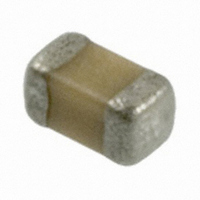04025A101FAT2A AVX Corporation, 04025A101FAT2A Datasheet - Page 14

04025A101FAT2A
Manufacturer Part Number
04025A101FAT2A
Description
Cap Ceramic 100pF 50VDC C0G 1% SMD 0402 Paper T/R
Manufacturer
AVX Corporation
Type
Flatr
Series
0402r
Specifications of 04025A101FAT2A
Package/case
0402
Mounting
Surface Mount
Capacitance Value
100 pF
Dielectric
C0G
Voltage
50 Vdc
Product Length
1 mm
Product Height
0.56(Max) mm
Product Depth
0.5 mm
Tolerance
1 %
Capacitance
100pF
Voltage - Rated
50V
Temperature Coefficient
C0G, NP0
Mounting Type
Surface Mount, MLCC
Operating Temperature
-55°C ~ 125°C
Applications
General Purpose
Package / Case
0402 (1005 Metric)
Size / Dimension
0.039" L x 0.020" W (1.00mm x 0.50mm)
Thickness
0.56mm Max
Dielectric Characteristic
C0G / NP0
Capacitance Tolerance
± 1%
Voltage Rating
50VDC
Capacitor Case Style
0402
No. Of Pins
2
Capacitor Mounting
SMD
Rohs Compliant
Yes
Case Size
0402
Material, Element
Ceramic
Termination
SMT
Voltage, Rating
50 VDC
Operating Temperature Range
- 55 C to + 125 C
Temperature Coefficient / Code
C0G (NP0)
Product
General Type MLCCs
Dimensions
0.5 mm W x 1 mm L x 0.560 mm H
Termination Style
SMD/SMT
Lead Free Status / RoHS Status
Lead free / RoHS Compliant
Features
-
Ratings
-
Lead Spacing
-
Lead Free Status / Rohs Status
RoHS Compliant part
Other names
478-3658-2
General Description
In practice the current leads the voltage by some other
phase angle due to the series resistance R
ment of this angle is called the loss angle and:
for small values of
which has led to the common interchangeability of the two
terms in the industry.
Equivalent Series Resistance – The term E.S.R. or
Equivalent Series Resistance combines all losses both
series and parallel in a capacitor at a given frequency so
that the equivalent circuit is reduced to a simple R-C series
connection.
Dissipation Factor – The DF/PF of a capacitor tells what
percent of the apparent power input will turn to heat in the
capacitor.
The watts loss are:
Very low values of dissipation factor are expressed as their
reciprocal for convenience. These are called the “Q” or
Quality factor of capacitors.
Parasitic Inductance – The parasitic inductance of capac-
itors is becoming more and more important in the decou-
pling of today’s high speed digital systems. The relationship
between the inductance and the ripple voltage induced on
the DC voltage line can be seen from the simple inductance
equation:
Dissipation Factor =
Watts loss = (2 π fCV
Loss
Angle
Power Factor (P.F.) = Cos
Dissipation Factor (D.F.) = tan
I (Ideal)
V = L di
E.S.R.
IR
I (Actual)
the tan and sine are essentially equal
f
s
dt
2
E.S.R.
) (D.F.)
X
C
Phase
Angle
= (2 π fC) (E.S.R.)
f
or Sine
C
S
. The comple-
V
The
0.3 A/ns, and up to 10A/ns. At 0.3 A/ns, 100pH of parasitic
inductance can cause a voltage spike of 30mV. While this
does not sound very drastic, with the Vcc for microproces-
sors decreasing at the current rate, this can be a fairly large
percentage.
Another important, often overlooked, reason for knowing
the parasitic inductance is the calculation of the resonant
frequency. This can be important for high frequency, by-
pass capacitors, as the resonant point will give the most
signal attenuation. The resonant frequency is calculated
from the simple equation:
Insulation Resistance – Insulation Resistance is the
resistance measured across the terminals of a capacitor
and consists principally of the parallel resistance R
in the equivalent circuit. As capacitance values and hence
the area of dielectric increases, the I.R. decreases and
hence the product (C x IR or RC) is often specified in ohm
faradsor more commonly megohm-microfarads. Leakage
current is determined by dividing the rated voltage by IR
(Ohm’s Law).
Dielectric Strength – Dielectric Strength is an expression
of the ability of a material to withstand an electrical stress.
Although dielectric strength is ordinarily expressed in volts, it
is actually dependent on the thickness of the dielectric and
thus is also more generically a function of volts/mil.
Dielectric Absorption – A capacitor does not discharge
instantaneously upon application of a short circuit, but
drains gradually after the capacitance proper has been dis-
charged. It is common practice to measure the dielectric
absorption by determining the “reappearing voltage” which
appears across a capacitor at some point in time after it has
been fully discharged under short circuit conditions.
Corona – Corona is the ionization of air or other vapors
which causes them to conduct current. It is especially
prevalent in high voltage units but can occur with low voltages
as well where high voltage gradients occur. The energy
discharged degrades the performance of the capacitor and
can in time cause catastrophic failures.
dt
di
seen in current microprocessors can be as high as
f
res
=
2
1
LC
P
shown
69









